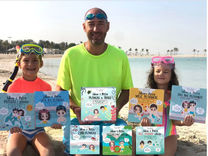Blog guest: Sara Isakovic
- Sep 9, 2018
- 3 min read
Updated: Apr 1, 2020
Sara Isakovic won a silver medal at the Olympic Games in Beijing in 2008, when she was only 20. She is the only woman, next to Federica Pellegrini, who managed to swim 200m freestyle under the magic limit of 1min 55second, and they both set a new world record. Today, after a very successful swimming career, Sara helps young athletes to understand their priorities both in swimming and their lives. As a Swimming Dad #Blog guest, she talks about her education, and whether it helped her to achieve top results, how she managed to balance between the school and trainings, and whether the world record is more important than education.
How can education help a top-class athlete?
In my opinion, education is crucial for the elite athletes’ lives. We know ourselves as athletes and that becomes our identity. “I am a swimmer,” I used to say most of my life. The problem with that is that, once you finish your athletic career, you get to a point when you ask yourself “who I am?” Education helps you develop an identity outside the sport or at least broadens your horizons about what else you enjoy and like to do, beside your sport. Personally, it also helped me keep my mind off swimming. I enjoyed being occupied with my studies and not having to think so much about how tough practices were and how tired I was. I know how some athletes are never able to finish school, and they find new things to do in life despite not “graduating”. Some stay in their sport forever and share their knowledge with younger generations. It depends on the person how you understand education and what you think of it. In my opinion, it was very valuable for the job that I do today.
How did you manage to combine the two?
I was always able to combine the two because I was very hard working and used every single minute (when I was out of the pool) to do homework and study. My mom used to drive me from practice to school and back (200 km
each day) so I could have enough time to balance classes and practices. I also went to the U.S. on purpose, so I could better combine swimming and education at the world class level. In the U.S. student athletes are highly valued and respected and people understand the effort and commitment it takes to do both.
What was the turning point when you decided whether you wanted to be a professional swimmer or to study?
I always knew I wanted to continue my studies because education was my number one priority.
Is a world class result more important than education?
A world class result is important in sports where you can make a living out of your sports success. In swimming that isn’t so. If you want to continue doing what you love and also making a living out of it, education is very important. Education doesn’t mean just going to school, you can be a self-taught master (design, art, video making, etc.) or gain experience in a certain industry because you’ve been exposed to it. My swimming results, however, helped me get a full scholarship at Berkeley, so my swimming success did play an important role in my life. My Olympic silver medal also gives me additional credibility to work as a performance psychologist today, because I understand
what it means to perform under pressure. Swimmers, who I work with, in particular, understand my lectures because of my experience and the education to contribute to the quality of my teaching.
Do elite sports inhibit education or it’s the other way around?
In some countries being an elite athlete plus student is near to impossible. So yes, sports can inhibit education because sometimes athletes need to skip classes or take lectures at different times - but the education system doesn’t provide that flexibility. In many other countries, as in was my experience in the U.S. you can combine both because the system is made in a way where you can study and train in close proximity (on a college campus).
Who was your biggest support in combining education and sports?
Definitely my parents. :)


























































Comments